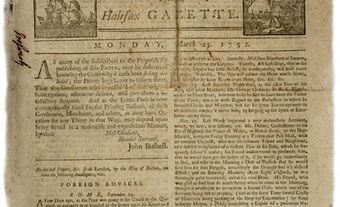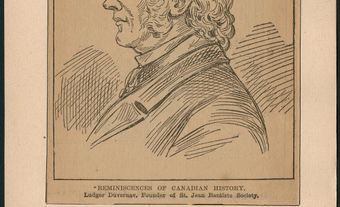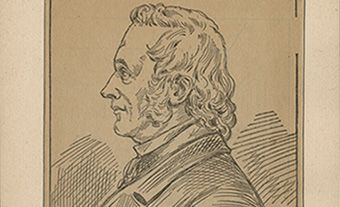
Background
In the decades that followed the Constitutional Act of 1791, a struggle developed in Lower Canada that eventually led to armed insurrection (see Rebellion in Lower Canada). Inspired by the rise of liberalism and nationalism that swept the Atlantic world at the turn of the 19th century, French Canadians sought greater authority and control over their colony. Leading this charge, the Parti canadien and its mouthpiece — Le Canadien — pushed for a governor general and executive and legislative councils that were accountable to the elected Legislative Assembly (see Responsible Government). Standing against them, the British mercantile elite (also known as the Château Clique, the British Party or the Tories) opposed any reform that would give the French Canadian-dominated Legislative Assembly more political authority.

Foundation
Founded in 1805 by Thomas Cary Sr., the Quebec Mercury represented the political and economic interests of the British Party against the demands of the Parti canadien. Initially a weekly newspaper, it began printing twice a week in 1816. The newspaper not only opposed all political reform that would give more authority to the French Canadian-dominated Legislative Assembly, but in these early years, it adopted a virulent anti-French Canadian tone, calling for their assimilation and the end of French laws and customs in the colony. In 1806, the newspaper published an editorial that stated: “This province is already too much a french [sic] province for an english colony. To unfrenchify it, as much as possible, if I may be allowed the phrase, should be a primary object.”

The newspaper’s anti-French Canadian editorials resulted in condemnations from Le Canadien, which supported political reform and defended French Canadian interests. In the decades that followed, both newspapers heavily debated and condemned each other’s perspectives.
Rebellion Era
In 1819, Thomas Cary Sr. handed control of the newspaper to his son, Thomas Cary Jr., who remained editor until 1855. In 1831, the newspaper turned from a biweekly to a triweekly newspaper. Cary Jr. also maintained his father’s editorial stance; however, his position towards French Canadians was much more moderate. This was likely due to the fact that between 1828 and 1848, the newspaper was co-owned by George-Paschal Desbarats, a French Canadian printer and businessman from Québec City.
Despite being more moderate, the newspaper remained biased against French Canadian political participation. It also continued to oppose any reform that would give the Legislative Assembly more authority, and continued to promote the interests of the British elite. For instance, following the Rebellion of 1837, the newspaper fully endorsed the decision to suspend the constitution and impose a Special Council. On 31 March 1838, the newspaper declared that these were necessary actions, arguing that French Canadians lacked “the intelligence requisite to enable the mass of the electors of Lower Canada discreetly to exercise their privileges.”
Though the newspaper was critical of the union of the Canadas — it was especially opposed to the condition that Lower Canada would have to pay Upper Canada’s debt — it still promoted the belief that it was the best course of action as it would, at the very least, limit French Canadian political influence (see Act of Union). On 25 January 1840, the newspaper explained that a return to the 1791 Constitution — and hence a French Canadian-dominated Legislative Assembly — would lead to the “ruin of the Anglo-Canadian population in this Province, and the speedy severance of its connexion with the Mother Country.”
Thomas Cary Jr. remained editor of the newspaper until 1855, when his son, George Thomas Cary, took over.
Later Years
In the decades following the rebellions, the newspaper continued to promote Tory interests. The newspaper’s editorial position was especially shaped by its new political editor, John Henry Willan, who remained in this position from 1850 to 1862. In the early 1850s, for instance, he used the pages of the newspaper to support the efforts of the Annexation Association, a group of English-speaking businessmen and French Canadian radicals (the latter known as the Rouges)who believed that Canada should join the United States. The newspaper again debated Le Canadien, which opposed the group’s aims.
Willan left the newspaper in 1862 when it was leased, for two years, to Josiah Blackburn, the owner of the London Free Press and Daily Western Advertiser. Blackburn used the Mercury to support the Liberal Macdonald-Sicotte government (1862–63) in Canada East. He severed his ties with the newspaper in 1864 after the resignation of the Macdonald-Dorion government (1863–64). During his time at the newspaper, Blackburn turned the Mercury into a daily and, on 10 January 1863, officially renamed it the Quebec Daily Mercury.
In 1864, Willan returned to the newspaper. Willan continued to support Tory policies, writing in favour of Confederation. Until it closed in 1903, the newspaper remained a supporter of the Tories. Ironically, Joseph-Israël Tarte — editor of Le Canadien, the Mercury’s long-time opponent — acted as publisher of the Mercury for a short time in the newspaper’s final years.

 Share on Facebook
Share on Facebook Share on X
Share on X Share by Email
Share by Email Share on Google Classroom
Share on Google Classroom


